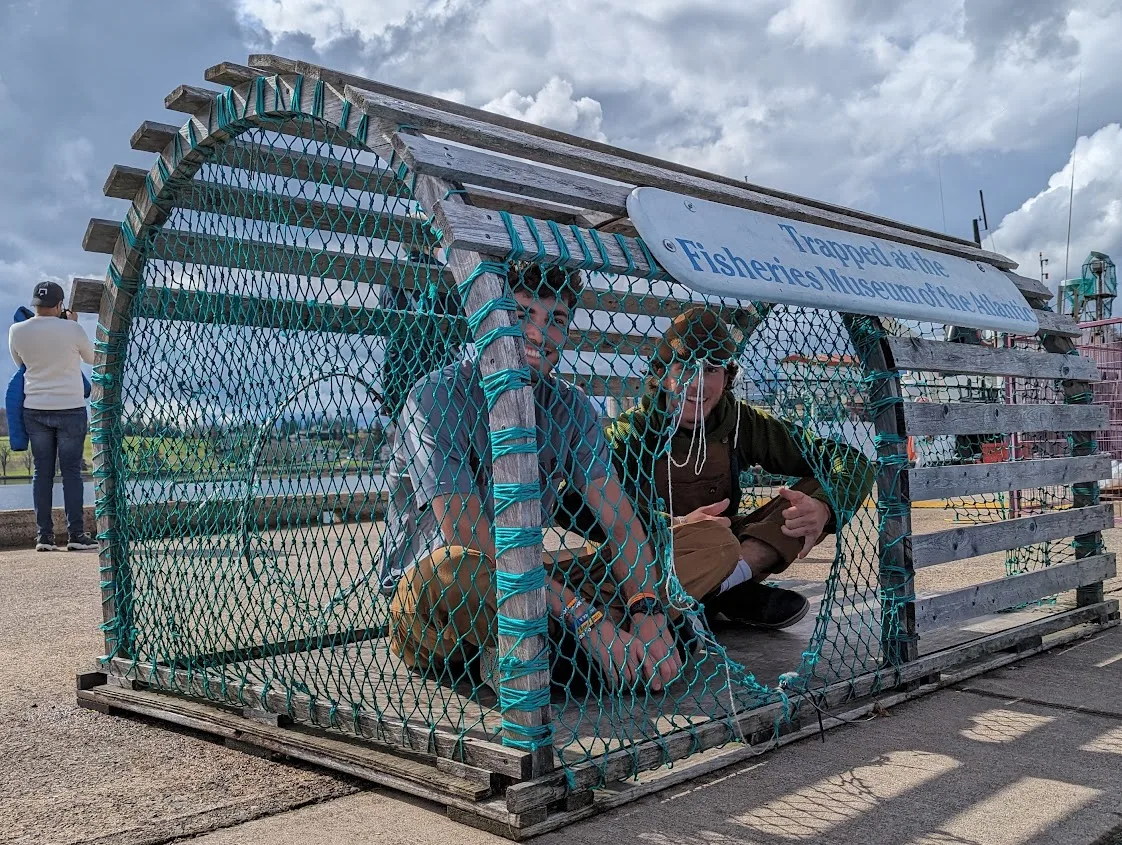Programs Blog
Port Stop Report: Lunenburg, Nova Scotia

Author: Ben Kochan, Visiting Assistant Professor of Maritime Studies
Ship’s Log
Date: October 16, 2023
Ship’s Position: Lunenburg Harbor
After ten days aboard the Corwith Cramer (including three days waylaid in Gloucester Harbor), Ocean Classroom students had plenty to be excited about upon arrival in port on October 12. Port has cheeseburgers and Cherry Coke. Port has laundry facilities, bookstores, and correspondence with loved ones. In port, bunks are mostly stationary and the watch schedule is less demanding, which provides new opportunities for sleep. You can walk more than 100 feet in one direction in port, and while walking, there is a nonzero chance of encountering cute dogs. All of this is genuinely exciting for young sailors returning from sea.
Pretty low on the list of things to be excited about, one might assume, would be “meeting your history teacher at the dock.” But enthusiasm is a limitless commodity with this group of Proctor Academy students, and I was flattered by the warm welcome I received when I arrived for our port stop in historic Lunenburg, Nova Scotia.
Lunenburg is a UNESCO World Heritage Site, recognized as the best surviving example of a planned colonial settlement in British North America. It has also been one of Nova Scotia’s principal fishing ports since its inception and was home to Canada’s most famous ship, the fishing and racing schooner Bluenose. Today, Lunenburg is the home port of her successor, the Bluenose II, as well as several other historic fishing vessels.
Our port stop began on Friday morning with a visit to the Lunenburg Fishermen’s Memorial, which lists the names of all the local sailors and vessels lost at sea. The memorial was a sobering reminder that fishing today is still a risky endeavor—several names have been added in the 21st century—but probably the most profound lesson was the risk involved a century ago, when men left the relative safety of their schooners to fish the North Atlantic in small rowboats known as “dories.” In the 1920s and 30s, scores of dory fishermen lost their lives every year in pursuit of the almighty codfish.
This lesson continued at our next destination, the Fisheries Museum of the Atlantic, where curators and volunteers had prepared a full day of activities and tours. Students went aboard the historic Grand Banks fishing schooner Theresa E. Conner (which made life aboard the Cramer seem luxurious by comparison), learned how to communicate using Morse Code, and spoke with men and women who had firsthand experience in local fisheries. The visit concluded with a “sharing circle,” adopted from the indigenous Mi’kmaq First Nation, where a scallop shell was passed around and everyone spoke about something meaningful from that day.
Following our museum visit, students had free time ashore. Most hiked a mile uphill to the local laundromat, followed by some fried food and last-minute phone calls before curfew at 1900.
The next day, Saturday, was Field Day, when students and crew members perform a deep, meticulous clean of entire ship, top to bottom. Following Field Day, it was time for me to depart for home, but not without another touchingly enthusiastic goodbye from the students. I look forward to seeing you all again in Woods Hole!
The Cramer, meanwhile, was due to depart for Bermuda Saturday afternoon. However, after consulting with our Marine Department about strong winds and large swells offshore, Captain Pamela made the prudent decision to remain in port. The new plan is to depart at first light on Monday, October 16, which should allow for a much more comfortable passage south to Bermuda.
Of course, just because their maritime studies teacher is going home and the ship’s departure is delayed, the learning does not stop onboard as students continue to process their oceanography data, meet with their book groups, and reflect in the journals.
Stay tuned for more updates!
Recent Posts from the Ships
- Ocean Classroom 2024-A collaborative high school program with Proctor Academy
- Collaborations and Long-term Commitments: SEA’s Caribbean Reef Program Sets a Course for Coastal Programs that Compliment Shipboard Experiences.
- Sea Education Association students prepare for life underway using state of the art nautical simulation from Wartsila Corporation.
- SEA Writer 2022, Magazines From the Summer SEA Quest Students
- Technology@SEA: Upgrades Allow Insight into Ocean Depths
Programs
- Gap Year
- Ocean Exploration
- High School
- Science at SEA
- SEA Expedition
- SEAScape
- Pre-College
- Proctor Ocean Classroom
- Protecting the Phoenix Islands
- SPICE
- Stanford@SEA
- Undergraduate
- Climate and Society
- Climate Change and Coastal Resilience
- Coral Reef Conservation
- Marine Biodiversity and Conservation
- MBL
- Ocean Exploration: Plastics
- Ocean Policy: Marine Protected Areas
- Oceans and Climate
- Pacific Reef Expedition
- The Global Ocean: Hawai'i
- The Global Ocean: New Zealand